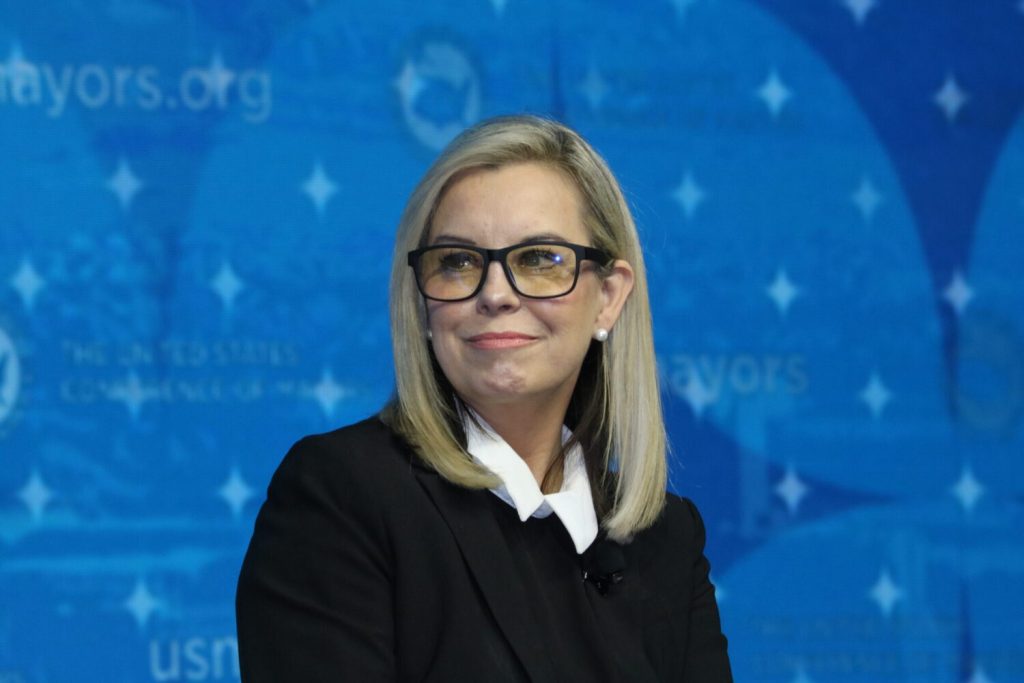
Reno is all set to experiment with blockchain and NFTs.
The City of Reno on Thursday announced it will launch Biggest Little Blockchain, a blockchain-based platform that will create and store records related to Reno’s Register of Historic Places. It will be the first city-run and resident-based blockchain platform in the United States, according to the city officials.
A day after the city announced the pilot project, Mayor Hillary Schieve spoke about the potential of blockchains at the U.S. Conference of Mayors annual meeting, which was held at the Peppermill in Reno.
“We just launched something on the blockchain where we will upload our historical registries,” Schieve told the crowd, “and that is really important because we want to preserve them.”
A blockchain is a digital ledger that records information or transactions in a decentralized network, which makes the data more difficult to alter or delete. While blockchains technology is often associated with cryptocurrency, the Reno project does not involve any type of cryptocurrency.
An ardent follower of cryptocurrency, Schieve said she has been personally investing in it for almost six years. At the mayor’s conference, she encouraged her peers from across the country to explore digital ventures and crypto transactions as well.
“I always say invest in innovation and technology if you truly, truly believe in it,” she said.
Once launched in Reno, the historic registry information would be digitally reachable to government officials and the public at all times. A press release for the project added that, if the pilot is successful, other city information – like regular maintenance work, permitting and licensing – might also be stored via blockchain.
Schieve said she sees this as a huge opportunity to showcase the transparency of governments.
Biggest Little Blockchain will use a blockchain platform called STRATO created by New York-based company BlocApps. It will be free for the city, according to a press release, and not a notable source of energy consumption or greenhouse gas emissions.
Reno’s pilot program is far less audacious than the last blockchains-related proposal pitched in Nevada. Last year, Gov. Steve Sisolak publicly backed a plan to allow private companies to create a new form of local government. The idea – dubbed “Innovation Zones” — was designed to benefit Blockchains LLC, a company backed by a cryptocurrency millionaire attempting to build a “smart city”on 67,000 acres of undeveloped land in Storey County. That proposed legislation, which was never formally introduced to the Legislature, was scrapped in favor of a study committee on the concept, then the committee was disbanded after Blockchains LLC said it was no longer pursuing the project because it “appeared to have no champion.”
NFTs
Schieve also announced that Reno will launch a public art NFT.
NFT stands for non-fungible token and can be used to buy digital art. NFTs have unique values of their own, unlike a dollar bill.
Embracers of NFTs say buying digital art with NFTs is different from owning a ‘save-as’ free version of any art piece on your computer. When digital art is bought with non-fungible tokens they cannot be duplicated or copied, giving an individual true ownership of the digital piece.
At the conference, Schieve said digital art NFTs can “unlock certain experiences.”
“This is going to be a way that we can sort of attract different ways of travel and tourism and people to experience our cities through NFT,” she added.
Last spring, Schieve suggested the city create NFTs with The Space Whale — a 50-foot stained-glass-and-steel humpback whale sculpture currently placed in the heart of Downtown Reno – and use the proceeds to support the arts. The Space Whale, which was originally created for Burning Man, was in need of repair after being damaged by weather and people climbing it.
Schieve’s NFT idea never materialized, and in November the city bought the sculpture from artist Matthew Schultz for $137,000 – $75,000 of which was for repairs.
Schieve, who was first elected mayor in 2014, is up for reelection this year and faces 10 challengers. Early voting is currently underway, and Primary Election Day is June 14.





























